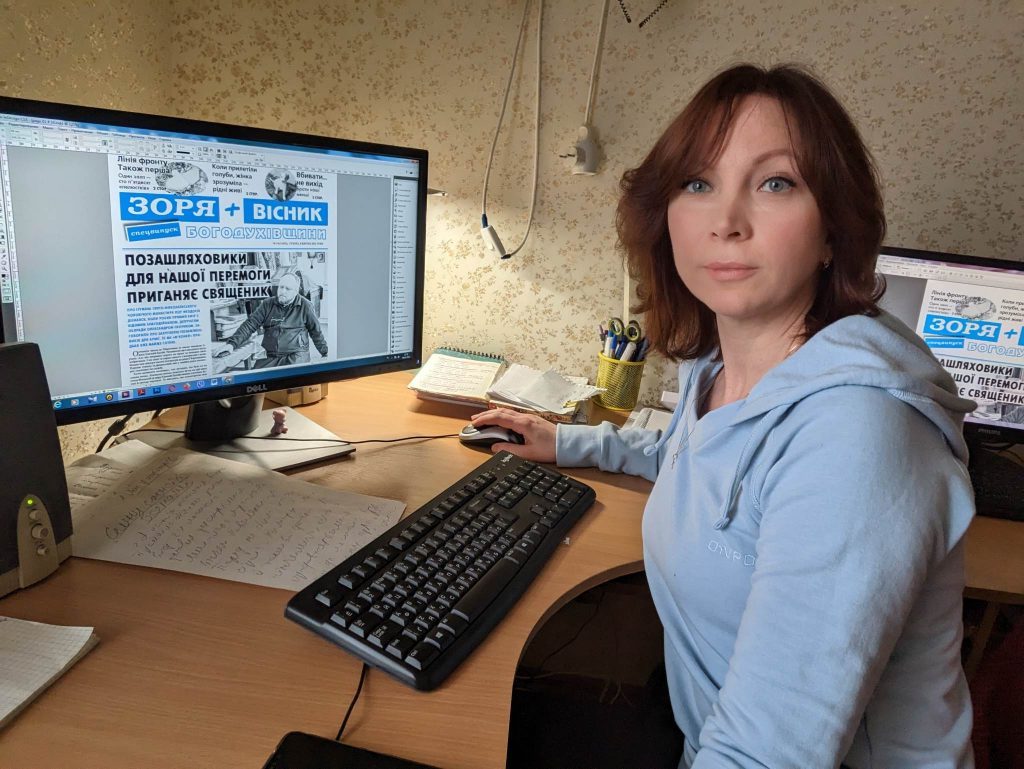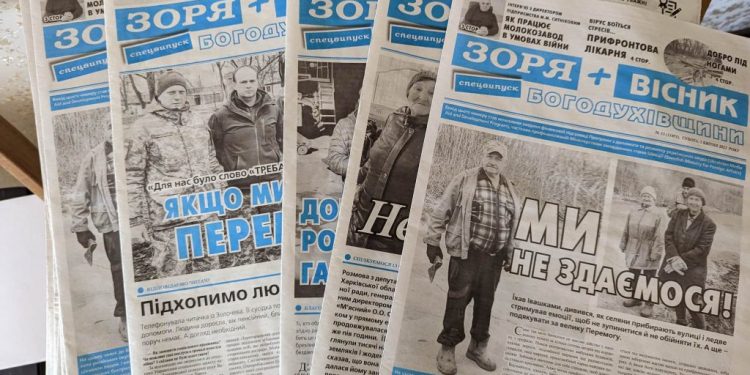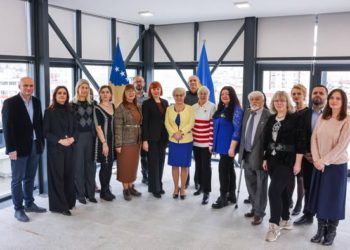For a significant part of the past 2002 year, Zolochiv in the Kharkiv region had the status of a frontline village: the front line passed directly through the territory of the community. The occupier was cast away, and the community formally ceased to be near the front, but in fact, it has remained so because it directly borders the territory of the russian federation.
The premises of the editorial office of the Zolochiv newspaper Zoria were fired at by the Russian military twice – in April and July 2022.
– We had just finished the repairs after the first shelling when the second time ‘flew in’ – says the editor-in-chief of Zoria Vasyl Miroshnyk. – Our windows were blown out again, and we decided to just cover them with plywood. The roof was also demolished; the armored door was swept away with a wave… The door was replaced; the roof was covered with old slate taken from the garage. We are convinced that they shot specifically at the editorial office. Neighbors were afraid to live next to us, and some even left…


More than half a year has passed, but the editorial office is still broken, it is impossible to work in it, and there are still no funds to repair it.
– With the beginning of the war and the terrible shelling of the Kharkiv region, two female employees of our editorial office moved to Lviv, I am one of them, said the deputy editor-in-chief Lesya Babkina. – We were very well taken in at the NUJU Journalists’ Solidarity Center. Among other things, we held an interesting training on creating a video component for social networks, which was conducted by a well-known producer from our Kharkiv region, Max Golovachov.
In Lviv, Kharkiv residents were invited to go to the Ivan Franko museum in Naguyevychi, as well as to Poland, and there were meetings with foreign financial donors and investors.
– All this was very interesting and useful. However, I did not go to Poland, because I decided to return home, says Lesya Vasylivna.

In Ukraine, there are dozens of publications that have not survived significantly less trials than Zoria from Zolochiv. It would seem that this newspaper was not destined to survive either. Since the beginning of the large-scale war, it has not come out, and the editorial office, headed by Vasyl Miroshnyk, decided to switch to its another publication – ‘Visnyk Bogodukhivschyny’, created specifically for the more affluent neighboring community. However, due to the collection of material in the frontline territories of the Zolochiv community, numerous appeals from local residents, the editor got convinced to publish ‘Zorya’ after all.
– We are grateful to the National Union of Journalists of Ukraine and foreign benefactors for the repeated financial support of our editorial office. In particular, funds were allocated for the printing of one of our issues, says Vasyl Miroshnyk. – To understand the importance of this help, I say that after the first shelling I didn’t even have a phone – everything that was on the tables in the editorial office was literally blown away by the explosive wave. It’s good that people were saved. Thanks to the help of NUJU and benefactors, we were able to purchase new equipment. The NUJU supported us a lot. I never helped the NUJU President, Sergiy Tomilenko, and he supported us, although I never asked for it. He just helped. I will never forget it.
However, despite the help, it soon became clear that the editorial office would not be able to pull out two newspapers together. Therefore, it began to publish a «double» paper edition under two logos: Zoria and ‘Visnyk Bogodukhivschyny’.
– I pick it up from the printing house and take it around communities, villages – says Vasyl Miroshnyk. – Even where they are shooting from Russian territory. The paper is published weekly, and my weekly route covers 360 kilometers, mostly on broken roads. I would really like to distribute the publication for free, but I do not have such an opportunity because I have to pay for both printing and gasoline; there are many other expenses as well. Therefore, I sell every copy. Moreover, I don’t have any problems with retail: the newspaper is waiting in larger settlements and in small villages, and the military at checkpoints. Young guys who shouldn’t be reading a newspaper at all are reading it! Because there is simply no Internet there.

During the period when Zoria was not published in the paper version, all the efforts of the editors were thrown into the development of the Facebook group. If at the beginning of the war the group included 5,000 readers, then already in the summer, their number reached 15,000. Vasyl Miroshnyk relates this to the fact that the editorial office publishes a lot of useful materials and live broadcasts from the places of events: first it was combat operations; now – the results of enemy shelling, efforts of border communities to revive and survive in conditions when 40% of the fields are «sown» not with grain, but with landmines, when half of the people went abroad, when only in the Zolochiv community there were killed 64 civilians, including small children, and damaged 1,700 households. According to Vasyl Miroshnyk, there were days when Zolochiv was fired upon 18 times, and shrapnel on its streets was «like fallen leaves in autumn».
One of the stories of the publication is about how a 32-year-old woman recently opened a pizzeria in war-torn Zolochiv!
– There are ruins all around. However, when you enter the establishment itself, it’s cozy and smells like pizza. Moreover, one gets the impression that there is no such fear around, as if peaceful life continues – says Vasyl Miroshnyk. – The owner does everything at her own expense. She does not go to a peaceful city but invests where all her work can turn into dust at any moment. To be honest, what I saw brought tears to my eyes…
The publication makes inclusions from the places of events, video stories on hot topics, and interviews with people who live near the Russian border.
The editor told about one of the trips to the villages of Makarove and Turove, which the Defense Forces of Ukraine had liberated from the occupiers shortly before.
95 people live in Makarove today. During the occupation, the Russians killed 8. One of them, a stocky, very tall man, was hunted with a sniper rifle for fun by the Kadyrivs when he was just walking to the farm where he worked. People in Makarove and Turove were so intimidated that none of them wanted to tell anything on camera. Even the most patriotic of them, when they said something, constantly looked back towards the Russian border, said Vasyl Miroshnyk.
The journalist is convinced that the reason why the villagers are still afraid is the information vacuum. The publication of a printed edition in the border area, which until recently was the front line, is especially important because the Internet and even mobile communication often disappear here. Moreover, there are places where these benefits of civilization never existed.
The newspaper thanks Ukrainian and international charitable organizations, thanks to which the media managed to survive.
– We are very grateful to the National Union of Journalists of Ukraine, Japanese organizations – GREEN COOP and Japan Offspring Fund, and Ukrainian Association of Media Business, – says deputy editor Lesya Babkina. – Since there is practically no income from advertising, there is currently no alternative to such help. Besides, after our newsroom was damaged by shelling, people had nowhere to go to order ads. Therefore, the help of benefactors is a huge support for us.
According to the observations of Zolochiv newspaper workers, today, the printed word is regaining its meaning.
– For many readers, the old meaning of the newspaper is returning not only as a means of informing but also as a last resort in protecting their interests. When the full-scale war began, we received a call from an elderly man who had left for London: he had forgotten to turn off the lights in his house while leaving in a hurry. We left and turned it off so that there would be no unmasking, – said Vasyl Miroshnyk. – And there are many such cases. We are not just an editorial office; we are our own among strangers because strangers are very close.
This story about the media was created by the NUJU in the frame of the project «Improving Ukrainian Media Resilience in Ukraine», financed by Swiss Solidarity and implemented with the support of the Swiss non-profit organization Fondation Hirondelle and the Institute for Regional Media and Information (IRMI, Ukraine). Fondation Hirondelle and IRMI implement a project of institutional support for Ukrainian media editorial offices in the east, north, and south of our country, with an emphasis on the local press. They also launched a 10-month support program for 18 media.
Economic reference
Zoria newspaper
Distribution area: Bogodukhiv district (Kharkiv region)Editor-in-chief: Miroshnyk Vasyl

 THE NATIONAL UNION OF
JOURNALISTS OF UKRAINE
THE NATIONAL UNION OF
JOURNALISTS OF UKRAINE
















Discussion about this post